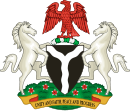
Back Cultura de Nigeria Spanish Culture du Nigeria French Al'adun Najeriya na gargajiya Hausa د نایجیریا کلتور Pashto/Pushto Cultura da Nigéria Portuguese Культура Нигерии Russian Utamaduni wa Nigeria Swahili
| This article is part of a series in |
| Culture of Nigeria |
|---|
 |
The culture of Nigeria is shaped by Nigeria's multiple ethnic groups.[1][2] The country has 527 languages,[3][4] seven of which are extinct.[5][6][7] Nigeria also has over 1,150 dialects and ethnic groups. The three largest ethnic groups are the Hausas that are predominantly in the north, the Yorubas who predominate in the southwest, and the Igbos in the southeast.[8][9][10][11] There are many other ethnic groups with sizeable populations across the different parts of the country. The Kanuri people[12] are located in the northeast part of Nigeria, the Tiv people[13] of north central and the Efik-Ibibio[14] are in the south South. The Bini people[15][16] are most frequent in the region between Yorubaland and Igboland.[17][18]
Nigeria's other ethnic groups, sometimes called 'minorities', are found throughout the country but especially in the north and the middle belt. The traditionally nomadic Fulani can be found all over West and Central Africa.[19] The Fulani and the Hausa are almost entirely Muslim, while the Igbo are almost completely Christian and so are the Bini and the Ibibio. The Yoruba make up about 21% of the country's population – estimated to be over 225 million – and are predominantly Muslim, with a notable Christian minority and a smaller presence of traditionalists.[20][21][22] Indigenous religious practices remain important to all of Nigeria's ethnic groups however, and frequently these beliefs are blended with Christian or Muslim beliefs, a practice known as syncretism.[23]
- ^ Nwafor (11 August 2022). "Nigerian cultural values are under threat, Toyin Falola, US scholar, warns". Vanguard News. Retrieved 4 November 2022.
- ^ "Culture – Ministry of Foreign Affairs, Nigeria". Retrieved 4 November 2022.
- ^ "Culture – Embassy of the Federal Republic of Nigeria to the Republic of Korea". Retrieved 20 November 2022.
- ^ "Language data for Nigeria". Translators without Borders. Retrieved 17 December 2022.
- ^ "Nigeria: most common languages spoken at home 2020". Statista. Retrieved 25 February 2022.
- ^ Lewis, M. Paul; Simons, Gary F.; Fennig, Charles D., eds. (2016). "Nigeria". Ethnologue: Languages of the World (19th ed.). Dallas, Texas: SIL International Publications.
- ^ omotolani (26 February 2018). "There are 27 languages close to extinction in Nigeria". Pulse Nigeria. Retrieved 17 December 2022.
- ^ Release, Press (22 April 2019). "Igbos, Yorubas have historical ties - Ooni of Ife". Premium Times Nigeria. Retrieved 4 November 2022.
- ^ Times, Premium (10 August 2022). "Nigeria: The politics of religion in a transitional society, By Rotimi Akeredolu". Premium Times Nigeria. Retrieved 4 November 2022.
- ^ Walubengo, Peris (8 October 2022). "Major tribes in Nigeria and their states with all the details". Legit.ng - Nigeria news. Retrieved 4 November 2022.
- ^ vanguard (10 May 2017). "Full list of all 371 tribes in Nigeria, states where they originate". Vanguard News. Retrieved 17 December 2022.
- ^ Al-amin, Usman (2021). "Tooth Dyeing Tradition among the Kanuri Speaking People of Borno, Nigeria". Journal of Science, Humanities and Arts - JOSHA. 8 (5). doi:10.17160/josha.8.5.789. ISSN 2364-0626. S2CID 244142418.
- ^ "Tiv | people | Britannica". www.britannica.com. Retrieved 17 December 2022.
- ^ "Efik | people | Britannica". www.britannica.com. Retrieved 17 December 2022.
- ^ brandtner, krista (26 December 2018). "Bini People - Discover African Art". Retrieved 17 December 2022.
- ^ "Edo | people | Britannica". www.britannica.com. Retrieved 17 December 2022.
- ^ Release, Press (22 April 2019). "Igbos, Yorubas have historical ties - Ooni of Ife". Premium Times Nigeria. Retrieved 4 November 2022.
- ^ "Lagos, Port Harcourt, Kaduna and Enugu: Tale of four cities The Nation Newspaper". 27 October 2022. Retrieved 4 November 2022.
- ^ "Fulani | People, Religion, & Nigeria | Britannica". www.britannica.com. Retrieved 17 December 2022.
- ^ Conversation, The (21 July 2022). "Islam has a small presence in Nigeria's Igbo region: what a new Quran translation offers". Premium Times Nigeria. Retrieved 20 November 2022.
- ^ "Christianity in Nigeria". rpl.hds.harvard.edu. Retrieved 20 November 2022.
- ^ Peel, J. D. Y. (1967). "Religious Change in Yorubaland". Africa: Journal of the International African Institute. 37 (3): 292–306. doi:10.2307/1158152. ISSN 0001-9720. JSTOR 1158152. S2CID 145810423.
- ^ "Chrislam: Defying Nigeria's Religious Boundaries". www.leidenislamblog.nl. 17 July 2015. Retrieved 17 December 2022.
© MMXXIII Rich X Search. We shall prevail. All rights reserved. Rich X Search


